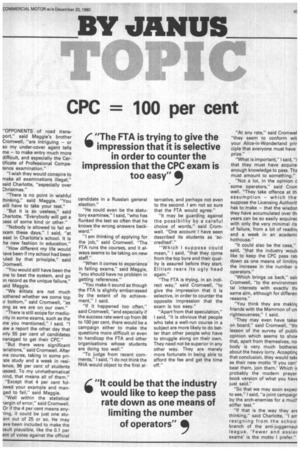CPC 100 per cent
Page 51

If you've noticed an error in this article please click here to report it so we can fix it.
w "The FTA is trying to give the impression that it is selective in order to counter the impression that the CPC exam is
too easy" 9
"OPPONENTS of road transport," said Maggie's brother Cromwell, "are intriguing — or so my under-cover agent tells me — to make entry much more difficult, and especially the Certificate of Professional Competence examination."
"I wish they would conspire to make all examinations illegal," said Charlotte, "especially over "There is no point in wishful thinking," said Maggie. "You Nill have to take your test."
"But it is so useless," said :harlotte. "Everybody will get a aass of some kind or other."
"Nobody is allowed to fail an ?Awn these days," I said, "at east in Charlotte's school. It is he new fashion in education."
"How different my life would lave been if my school had been :uled by that principle," said :romwell.
"You would still have been the )ne to beat the system, and go an record as the unique failure," ;aid Maggie.
"We elitists are not much )othered whether we come top >r: bottom," said Cromwell, "as ong as we are on our own."
"There is still scope for medio:rity in some exams, such as the me you mentioned," I said. "I ;aw a report the other day that )nly 55 per cent of candidates nanaged to get their CPC."
"But there were significant :a riations," said Cromwell. After ine course, taking in some pri:ate study and a week in resilance, 96 per cent of students iassed. To my unmathematical nind, that means all of them."
"Except that 4 per cent folawed your example and manged to fail," said Maggie.
"Well within the statistical largin of error," said Cromwell. Or if the 4 per cent means anyling, it could be just one stuent out of 25 or so. He may ave been included to make the asult plausible, like the 0.1 per ent of votes against the official
candidate in a Russian general election."
"He could even be the statutory examinee," I said, "who has flunked the test so often that he knows the wrong answers backward."
"I am thinking of applying for the job," said Cromwell. "The FTA runs the courses, and it always seems to be taking on new staff."
"When it comes to experience in failing exams," said Maggie, "you should have no problem in getting references."
"You make it sound as though the FTA is slightly embarrassed by the extent of its achievement," I said.
"If it happened too often," said Cromwell, "and especially if the success rate went up from 96 to 100 per cent, there would be a campaign either to make the questions more difficult or even to handicap the FTA and other organisations whose students are doing too well."
"To judge from recent comments," I said, "I do not think the RHA would object to the first al
ternative, and perhaps not even to the second. I am not so sure that the FTA would agree."
"It may be guarding against the possibility by a careful choice of words," said Cromwell. "One account I have seen described its students as 'accredited'."
"Which I suppose could mean," I said, "that they come from the top byre and their quality is assured before they start. Elitism rears its ugly head again."
"The FTA is trying, in an indirect way," said Cromwell, "to give the impression that it is selective, in order to counter the opposite impression that the exam is too easy."
"Apart from that speculation," I said, "it is obvious that people who take a well-run course in a subject are more likely to do better than other people who have to struggle along on their own. They need not be superior in any other way. They are merely more fortunate in being able to afford the fee and get the time off." "At any rate," said Cromwel "they seem to conform wit your Alice-in-Wonderland prir ciple that everyone must have prize."
"What is important," I said, "i that they must have acquire, enough knowledge to pass. The must amount to something."
"Not a lot, in the opinion e some operators," said Crom well. "They take offence at th assumption— which the suppose the Licensing Authorit
has to make — that the wisdon they have accumulated over thi years can be so easily acquirec with only the very minimal ris of failure, from a bit of readinc and a week in an academi, hothouse."
"It could also be the case," said, "that the industry woulc like to keep the CPC pass rati down as one means of limitinj the increase in the number o operators."
"Which brings us back," sal( Cromwell, "to the environmen tal interests with exactly thc same aim, although for clifferen reasons."
"You think they are makinj friends with the Mammon of un righteousness," I said.
"They may even have taker on board," said Cromwell, "thE lesson of the survey of public opinion which seems to shom that, apart from themselves, no body is very much botherec about the heavy lorry. Acceptinc, that conclusion, they would takE as their new motto 'If you can': beat them, join them.' Which probably the modern prayer. book version of what you havE just said."
"So that we may soon expeci to see," I said, "a joint campaigr by the arch-enemies for a much stiffer test."
"If that is the way they arE thinking," said Charlotte, "I am resigning from the schoo[ branch of the anti-juggernaui league. 'Fewer and easier exams' is the motto I prefer."




















































































